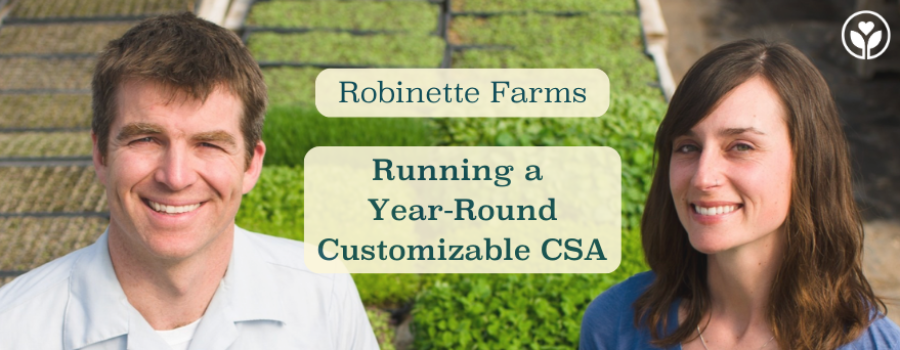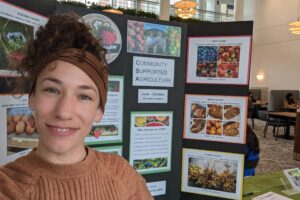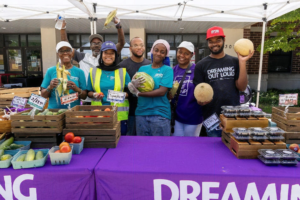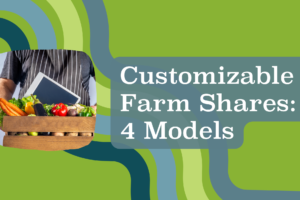Robinette Farms is a food hub located in Eastern Nebraska dedicated to connecting their community to over 30 local farmers and ranchers. In 2022, Robinette Farms transitioned from a single farm CSA model to a year-round customizable CSA, made possible through collaboration with other local food producers.
Initially our winter CSA was just available once a month and now it’s transitioned to every single week. Working with other producers has allowed us to close those gaps.”
— Chloe Diegel, Co-owner of Robinette Farms
In this blog post, we speak with Chloe Diegel, Co-owner of Robinette Farms, to explore how they collaborate with other local food businesses to offer a year-round, customizable CSA, and how they use Local Food Marketplace’s CSA software to manage it all.
Robinette’s Year-Round Customizable CSA Model: A Collaborative Approach
Robinette Farms offers customers a CSA model that has year-round availability with a fully customizable product selection and a “pay as you go” system where customers commit to the subscription but pay for each delivery as they go. To make this model a reality, Robinette works with other local food producers and even small businesses.
My mission is to enhance our local food economy. For us, that means collaborating with other producers and bringing in small businesses that are locally owned and sell food products.”
— Chloe Diegel, Co-owner of Robinette Farms
Interested in learning more about how Robinette Farms uses LFM to manage their year-round, multi-farm CSA? Watch the webinar now!
Watch the Webinar
Interested in learning more about how Robinette Farms uses LFM to manage their year-round, multi-farm CSA? Watch the webinar now!
Watch the WebinarWhy the Collaborative Approach Allows Robinette Farms to Offer a Year-Round Customizable CSA
Working with other producers allows Robinette to run a year-round customizable CSA that they wouldn’t be able to run otherwise. When they were previously working alone, the farm had to ensure they were experts in many different products to be able to offer a wide variety of items. Now, they can produce the products they grow well and profitably, while collaborating with other producers to do the same.
Working together means taking some of the stress off of having to have all this knowledge, expertise, equipment, and even storage.”
— Chloe Diegel, Co-owner of Robinette Farms
Local Food Marketplace’s CSA software makes it easy for Robinette Farms to collaborate efficiently and effectively with producers by automating the workflow and communication for both harvest- to-order and inventory products. Producers can easily track their sales, print labels, and run reports with a modern, easy-to-use interface.
LFM makes it super easy and efficient to communicate with your producers.”
— Chloe Diegel, Robinette Farms
When local food businesses seek collaboration, they can pool resources to tackle obstacles. If one farm is lacking in a certain area, they can work with another to fill that gap. Robinette Farms believes that the local food ecosystem is better off when farmers and other local food businesses work together rather than individually.
We really view local food production as a system of skilled people that can collaborate to make something bigger, stronger and better, but still local.”
— Chloe Diegel, Robinette Farms
Interested in learning more about how Robinette Farms uses LFM to manage their year-round, multi-farm CSA? Watch the webinar now!
Watch the Webinar
Interested in learning more about how Robinette Farms uses LFM to manage their year-round, multi-farm CSA? Watch the webinar now!
Watch the WebinarThe Community and the Producers Benefit from this Model
For local food to thrive, it must be integrated into the community. By collaborating on a year-round customizable CSA, farms can offer a model that appeals to customers, while also expanding their presence within the community, resulting in a more significant impact.
Robinette’s year-round CSA model allows producers the flexibility to participate when it suits them, giving them the option to contribute throughout the year without being tied to a rigid schedule.
Four Considerations of Offering a Year-Round Customizable CSA
1️⃣ Seasonal Operations
Operating across different seasons requires varying technology and infrastructure, such as cold storage and distribution sites.
When thinking about running a year-round CSA, it’s important to think about what kind of storage, packing, distribution, and infrastructure you currently have and how operating in a different season may impact that.”
— Chloe Diegel, Co-owner of Robinette Farms
While offering a year-round customizable CSA is still doable for an individual farm, collaboration makes these potential infrastructure obstacles easier to navigate. Using CSA software or farm software that is specific to the needs of these specialized producers can also make operations much easier.
2️⃣ Relationship Building
As we have discussed, strong relationships with other producers are an essential part of lessening the potential burdens of running a year-round CSA. If these relationships are not already in place, it’s important to begin exploring and building them. Once they are in place, maintaining them is key.
This model can require a lot of relationship building – however that looks for you.”
— Chloe Diegel, Co-owner of Robinette Farms
Aside from producer relationship-building, it’s important to maintain communication with customers week-after-week when running a year-round customizable CSA. Robinette Farms uses LFM’s CSA software to easily send an automated weekly email to customers letting them know what’s in their share for that week.

3️⃣ Adapting to Customer Customization
Shifting from a traditional CSA model to a customizable CSA may require a shift in mindset, since the farm has less control over what customers order in each share. When a share is fully customizable, there may be certain items that customers frequently swap — this means it’s important to adapt depending on what people are interested in. Robinette uses the in-depth sales reports in LFM’s CSA software to see what customers are choosing in their weekly shares and plan their crops & purchase orders accordingly in the future.
The sheer amount of reporting in LFM makes it easy for us to get the data we need to continually improve our business.”
— Chloe Diegel, Robinette Farms
Since the customers have this customizable option, having multiple sales channels is one way to ensure product doesn’t go to waste. With LFM’s CSA software, Robinette can manage all of their sales channels from one platform and fully customize each buyer’s pricing and product availability.
I think the important thing for fully customizable models is to just cultivate other sales channels, like wholesale or introducing value-added items, so that you can move product if it doesn’t sell in the CSA.”
— Chloe Diegel, Robinette Farms
4️⃣ Learning Curves
One farm’s challenges may differ from another’s, but what is consistent is that adjusting to a year-round customizable CSA model is a learning curve that will require adaptation and experimentation.
Going from a traditional CSA model to a year-round customizable one is an adjustment that most farms will figure out over a season or two.”
— Chloe Diegel, Co-owner of Robinette Farms
Interested in learning more about how Robinette Farms uses LFM to manage their year-round, multi-farm CSA? Watch the webinar now!
Watch the Webinar
Interested in learning more about how Robinette Farms uses LFM to manage their year-round, multi-farm CSA? Watch the webinar now!
Watch the WebinarRobinette Farms Uses LFM’s CSA Software to Manage their Year-Round Farm Share Program
Local Food Marketplace is a farm and CSA software program built to streamline the back-end administration while providing a seamless shopping experience for customers. LFM makes it possible for farms to collaborate on selling and distributing local food in whichever way they find the most successful.
Here are the key LFM features Robinette Farms uses in their weekly workflow to manage their year-round customizable CSA:
✔️ In-depth sales reports to see what is or isn’t selling and plan accordingly in the future.
✔️ Automated workflow and producer communication for both harvest to order and inventory products. Producers can easily track their sales, print labels, and run reports with a modern, easy to use interface.
✔️ Advanced inventory capabilities allow Robinette to manage purchase orders with producers and efficiently keep a true record of each item in their inventory.
✔️ CSA and wholesale management all in one place — Robinette Farms can pull from the same availability and have multiple sales channels without any extra admin work.
✔️ Automated weekly “what’s in the box” email to customers letting them know what’s in their share for that week.
✔️ Automation capabilities for tasks like pick tickets and reminder emails reduce administrative work.
LFM allows us to automate a good majority of admin work – I haven’t seen this level of automation in other platforms.”
— Chloe Diegel, Co-owner of Robinette Farms






